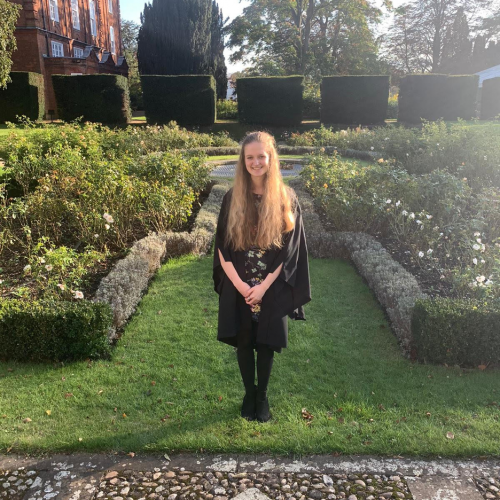
Hi, I’m Amber and I read veterinary medicine at Newnham College, Cambridge. I chose to study this subject as I have always had an interest in biology and loved the diversity of the profession, both in terms of species to treat and skills used in practice.
The course is very much split into two halves- a more theoretical preclinical course that covers a lot of science during years 1-3 and a heavily practical clinical course in years 4-6. During your third year, you study a different subject of your choice e.g. pathology or zoology and get an extra degree in that. I enjoy this split of the course as I feel that it prepares me well for solving abstract problems without compromising practical skills.
In a typical week, you can expect 10 hours of lectures, 2-3 dissections, 2-3 other laboratory based practicals and, during some terms, an animal handling session. On top of this, you will get an hour long supervision for each major topic to go through your content again. You are set essays or past papers to do every week by your supervisors. This may sound like a lot, but it does get easier to keep up with over time.
In my personal statement, I talked about my work experience and mentioned what I did, what I learned from it and what it led me on to do. The majority of your personal statement has to be about work experience and demonstrate that you didn’t do a placement just to fill the requirement, you did it because you were interested and have learned from the experience. I linked in various pieces of further reading e.g. brachycephalic dogs and exotic animal anatomy and went on to think about how I would answer questions about it. It is very likely that you will be asked about things you put on your personal statement, so be prepared to be grilled on anything you put on it.
I personally quite enjoyed my interview experience as both of my interviews were very science based and covered interesting content. What I found really helped in my interviews was to make sure that my A level knowledge of biology and chemistry was really sharp. A lot of the questions started off with something I was expected to know and required me to think and apply knowledge to answer trickier questions. If there was something I didn’t know the answer to, I would talk through something I did know and come up with a solution based on that.
What I wish I’d known before I applied was just how much I would enjoy the course. I had seen various rumours about veterinary medicine at Cambridge such as there being no animal contact and it being boring and unenjoyable. I was a bit put off initially, but I am glad that I went ahead and applied as the rumours couldn’t be further from the truth!
Overall, I would definitely encourage applicants who love the science behind veterinary medicine to give Cambridge a go, I applied here thinking “I’ll give it a try” and was never the top of my class or a perfect applicant. The only way you’ll know if Cambridge is possible is if you apply!
